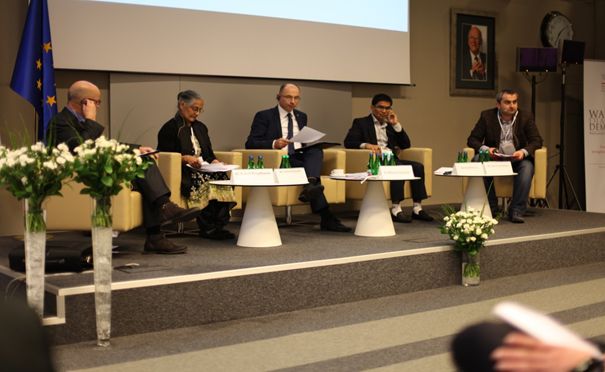 On the 15-16 December 2016 the Ministry of Foreign Affairs of the Republic of Poland in cooperation with the Institute of National Remembrance and other entities, organised the fifth edition of an annual event called the Warsaw Dialogue for Democracy. This year’s edition was entitled “From Past to Future: Strengthening Democratic Values” and focused on the methods which could be employed in order to reinforce vital democratic standards, providing the guests with room for discussion on the tasks of government and civil society in preserving those fundamental values.
On the 15-16 December 2016 the Ministry of Foreign Affairs of the Republic of Poland in cooperation with the Institute of National Remembrance and other entities, organised the fifth edition of an annual event called the Warsaw Dialogue for Democracy. This year’s edition was entitled “From Past to Future: Strengthening Democratic Values” and focused on the methods which could be employed in order to reinforce vital democratic standards, providing the guests with room for discussion on the tasks of government and civil society in preserving those fundamental values.
The Warsaw Dialogue for Democracy was framed around a high-level opening session and four panel debates. The participants of the conference were invited to take part in two thematic workshops namely, “Civic activism and the struggle for democracy in the European Neighbourhood” and “Towards an Enabling Legal Framework for Freedom of Association”.

The panel discussions were devoted to transitional justice, protection of the rights of persons belonging to religious minorities, citizen oversight on elections and the fight against corruption, as well as nurturing democracy through education. The thematic debates were complemented by workshops dedicated to practical aspects of pro-democracy activities.
The panel session, organised by the Institute of National Remembrance, was entitled “Unfinished reckoning with the past?”.
The underlying theme of the panel was transitional justice. Despite different paths leading to democracy the complete reappraisal of the past is a common problem of many countries and societies. It is not solely the question of taking the guilty to court or serving justice to the victims, but also of the investigation and description of the subject by historians. Even in countries such as Poland, where the Institute of National Remembrance was established, it has been only partly successful.
 The panelists focused on issues related to attempts of coming to terms with the painful past in their respective countries – crimes from the period of dictatorships and totalitarian rule. In addition to the issues related to the legal and judicial settlements (e.g. the crimes of Stalinism in Poland), further the issue of public awareness and education, the methods of teaching about these painful pages of history (on the example Cambodia) were also discussed. Moreover, the panelists touched upon the question of the unresolved past of the Stalinist period in Georgia. The participants of the discussion shared their opinions, knowledge and experience while answering questions posed by the moderator:
The panelists focused on issues related to attempts of coming to terms with the painful past in their respective countries – crimes from the period of dictatorships and totalitarian rule. In addition to the issues related to the legal and judicial settlements (e.g. the crimes of Stalinism in Poland), further the issue of public awareness and education, the methods of teaching about these painful pages of history (on the example Cambodia) were also discussed. Moreover, the panelists touched upon the question of the unresolved past of the Stalinist period in Georgia. The participants of the discussion shared their opinions, knowledge and experience while answering questions posed by the moderator:
1. Has your country managed to come to terms with the difficult past?
 2. What problems has your country encountered during this process?
2. What problems has your country encountered during this process?
3. What are the prospects of reconciliation with the past?
4. To what extent can the Polish experience and measures taken to reappraise the past serve as an example for other countries undergoing the process of democratisation?
The moderator of the discussion was Dr Mateusz Szpytma, Deputy President of the Institute of National Remembrance and the panellists included: Tahira Abdullah, an economic development practitioner, researcher, author, peace activist, human rights defender and humanitarian volunteer, based in Islamabad, Pakistan, Dr Khamboly Dy, Director of the Department of Policy of the Cambodian Ministry of Education, Youth and Sport, David Jishkariani, a researcher and founder of the Soviet Past Research Laboratory (SovLab) and Robert Kopydłowski, a prosecutor at the Institute of National Remembrance, Chief Commission for the Prosecution of Crimes Against the Polish Nation.
